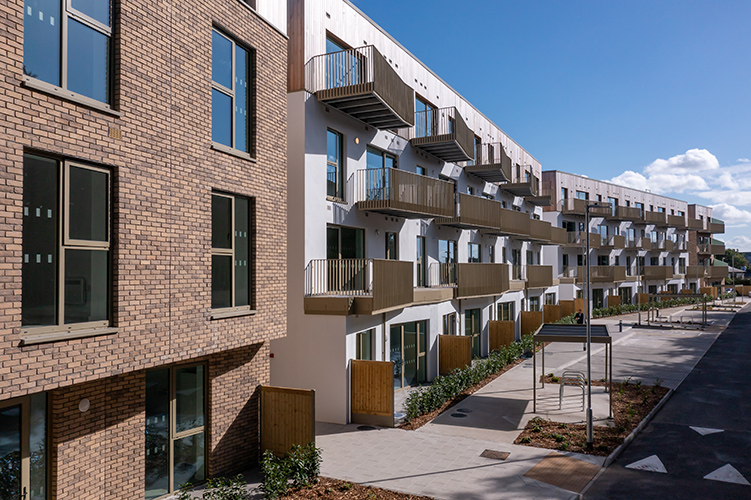
HUGH MCCANN, Development Manager, Bluemont, speaks with Robbie Cousins about the opportunities and challenges that Housing for All presents for developers.
The government’s housing delivery plan up to 2030 Housing for All sets out four pathways to achieve four overarching objectives:
- Supporting homeownership and increasing affordability;
- Eradicating homelessness, increasing social housing delivery and supporting social inclusion;
- Increasing new housing supply; and,
- Addressing vacancy and efficient use of existing stock.
Each pathway contains a set of actions to achieve a specific set of objectives. The plan allocates the largest housing budget in the state’s history to support these pathways, with more than €20bn in funding through the exchequer, the Land Development Agency (LDA) and the Housing Finance Agency over the next five years. This also is intended to support the creation of an enabling framework of a more sustainable housing system to meet the country’s housing needs in the coming years.
Bluemont
Bluemont was founded on the back of 20 years of successful project delivery across Ireland and the UK. The brand was established to consolidate the company’s development approach – raising the bar in terms of design while being mindful of buildability and viability. The company focuses on developing residential and healthcare facilities and works out of offices in Dublin and London.
As housing development comprises the majority of Bluemont’s portfolio of work, the Housing for All plan will impact the decisions that the developer’s management team make over the coming years. One member of that team, Development Manager Hugh McCann, says that Housing for All should be welcomed by the housing sector as it proposes more joined-up thinking between government departments and agencies, as well as committing the levels of funding that are required to make a serious impact on addressing the current housing crisis.
Holistic plan
“Housing for All gives the sector a plan that for the first time proposes taking a more holistic approach to housing delivery, and it acknowledges many of the challenges that the sector faces in delivering housing,” comments Hugh McCann. “It has ambitious targets. It aims to deliver 156,000 private homes, 90,000 social homes, 36,000 affordable units, and 18,000 cost rentals. It is good to see these numbers. Its annual target of 33,000 residential units is good, although some think it should be 40,000 units.
“The plan’s ambitions are not limited to housing output; it is also setting out to reform the planning process and establish processes and systems that will facilitate more efficient housing delivery.
“The fact that the plan is funded from the start is a big plus. The €20bn committed over the next five years shows that the government is serious about trying to deliver.”
Social housing
As a developer of social housing, McCann says Bluemont welcomes the fact that the role of AHBs is being further enhanced and that the LDA is being given a greater role in the release of public lands for development. He adds that it is essential that there is a genuine all-government cross-departmental approach to the plan, including local authority involvement.
“Government departments and public agencies must work together to monitor and progress the plan, or it will not succeed.”
Plan challenges
Hugh McCann says, however, that he will be watching to see how this collaborative approach develops.
“Taking a collaborative approach to housing delivery also means that the government and its agencies work in partnership with the private sector. For this to succeed, there needs to be joined-up thinking and action. The whole process needs to be integrated from government departments to local authorities, An Bord Pleanála and utility providers, right through to financing, developers, AHBS and builders. We all have to be able to work better together.”
Legislative reform will be critical.
“It is clear that there will be a need for substantial legislative changes for the plan to be realised, particularly in the area of planning where there are several reforms required,” McCann continues. “With additional legislation comes additional costs, and it will be essential to strike a balance between increasing standards and delivering the plan’s objectives.
“Some reforms can have unintended consequences. For example, the complexity of regulation in the private rental sector has led to a significant number of small private landlords leaving the market with a loss of further rental stock in an already undersupplied market.”
Irish planning process
The process of delivering larger developments is being reviewed. Flaws in the Strategic Housing Development (SHD) process have been recognised, with substantial delays, particularly as a result of judicial reviews. The introduction of new arrangements for large scale residential developments (LSRDs) will supersede the existing SHD process, which is currently due to lapse at the end of February 2022.
Hugh McCann says that the planning process, to some degree, is being returned to its original form, with applications being made to local authorities in the first place. But he contends that this should happen with several important reforms. In theory, the new process should lead to greater consultation with third parties, resulting in less need for judicial reviews.
“The General Scheme of Planning and Development (Amendment) (LSRD) Bill 2021 needs to ensure that uncertainty in terms of risk, costs and delays are removed from the planning process,” he comments. “In addition, the pre-planning consultation process needs to be streamlined with clear statutory deadlines providing applicants with certainty on timelines for lodging planning applications.
“Clarification will be required in relation to the ‘further information requests’ process, and further changes will be required to address the number of judicial reviews of SHD applications.”
He adds that currently, it is estimated that the judicial reviews associated with SHDs are adding €8,000 to €12,000 per unit cost for developers and another 12 months to the process.
“Developers using the SHD process are in a situation whereby they could be spending more time in planning than they are building their developments. The Housing for All plan acknowledges these issues and commits to carrying out a comprehensive review of current planning legislation and establishing a new court division with the expressed remit of dealing with planning and environmental issues. Comprehensive reform of the planning process will be critical to the plan’s success.”
Finally, in the area of planning, McCann says that there needs to be greater innovation and technology adoption, particularly in relation to e-planning by local authorities.
“Currently, there is a situation where we have to provide multiple boxes of hard copy documentation for planning submissions. Technological advances should facilitate the planning submission process to be fully digitalised. This would increase efficiency and reduce time and costs for the applicant.”

Utility provision
Hugh McCann welcomes the fact that many of the problems experienced by developers and contractors with utility provision are also acknowledged in the plan.
“Delays with connections and additional charges are a constant problem for developers and contractors. This can be resolved by providing greater resources to reduce the pre-connection enquiry process and shortening the connection timescales that are delaying developments being completed by several months.”
He continues by saying that it is encouraging to see that the principle whereby the first developer pays for the inputting of greater infrastructure than is required for their landbank will be reviewed.
“The fact that there is recognition that this area needs to be addressed is positive.”
McCann adds that when it comes to utilities, it all comes back to absolute clarity on what needs to be invested in utilities and knowing the time it will take to bring sites online.
“Utility companies need to give developers more certainty about what infrastructure will look like in an area, so we can plan and not get hit by unexpected delays, amendments or costs. We need greater certainty on costs and timing. If we had this, then the process would operate more efficiently. There needs to be greater investment in resources, people and upgrade works on the government’s and utility companies’ side.”
Vacancy and efficient use of existing stock
Hugh McCann believes the vacant properties element of the plan may be too challenging to resolve.
“There are many properties in towns across the country that are vacant because of a number of complex issues, and it can be challenging to identify who actually owns these properties,” he comments. “This area is complex, and in the end, there may not be as many properties being released as the plan projects. For example, if you take the area of probate, it can take years before a property could be released back for occupation.
“Also, the cost of refurbishing these properties to current standards/regulations may be prohibitive, particularly to meet current fire regulation standards. The principle of creating new vibrant city centres and rejuvenating vacant property would be welcome but will be challenging to achieve.”
Industry challenges
Brexit, Covid-19, building materials costs, skills shortages and sector efficiency are all issues that are centre stage in the construction sector at the moment. Hugh McCann says that the construction sector is working to address these issues, but the government also needs to be proactive, or this will have consequences for Building for All.
“We are all aware of many of the issues affecting building materials costs. Timber and steel prices have risen significantly over the past 18 months. The whole supply chain has been massively interrupted by events over the past two years, and, of course, there are labour shortages in the sector.
“The Housing for All plan sets objectives to reduce construction costs through areas such demolition waste management amendments, improving supply chains, policies for increasing the workforce and promoting innovation in the construction sector. Most of these proposals will take time to implement. However, in some areas, urgent action could be taken. For example, in Ireland, there has been a backlog of 6,000 forestry and felling licences to be granted, which would have eased the pressure on timber supply.”
Modern building practices
McCann says that the construction industry is making progress in addressing efficiency issues also. “This progress will be crucial to the delivery of housing in the coming years. Lean construction, modern methods of construction (MMC) and digital construction technologies all need to be standard as soon as possible across the industry.
“By employing lean construction methods, we are reducing costs and enhancing quality. We need systems and processes that encourage and facilitate collaboration on projects from an early stage. Building information modelling (BIM) has been a real game-changer for the efficiency of project delivery.”
Bluemont recently completed a scheme where it used bathroom pods manufactured in Ireland with the full unit including painting and tiling completed off site.
“The quality of these units is so good that you would not know that they were manufactured. Previously, to achieve this, you would require seven tradespeople on site working in close proximity to each other.
“We are also looking at precast concrete panel solutions to increase the speed of delivery of projects. All of these off-site solutions are available in Ireland, which also reduces carbon emissions.”
In the aftermath of COP26, Hugh McCann says that the construction sector needs to take a holistic look at decarbonisation and move quickly to take action on this.
“MMC, lean and digital construction technologies all have a role to play in reducing the sector’s carbon emissions.”
In conclusion
Overall, Hugh McCann says Housing for All sets ambitious targets, and there needs to be massive reform in the planning process and infrastructure delivery for it to succeed. The construction sector also needs to play its part.

